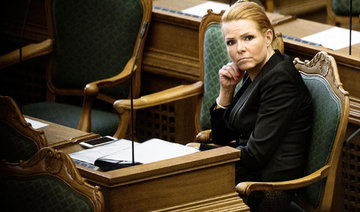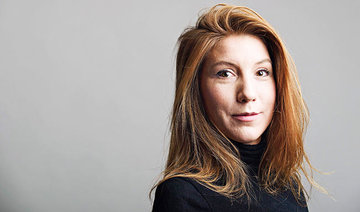TALLINN, Estonia: She was a promising young journalist, tested in trouble spots throughout the world, reporting on a Danish inventor famed for building what was thought to be the world’s largest private submarine. The story seemed to present little danger, but it cost Kim Wall her life.
The Swedish journalist’s dismembered, naked torso was found on a southern Copenhagen coast in late August and her head, legs and clothes were later discovered in plastic bags at sea. The bags also contained a knife, and heavy metal objects designed to take them to the ocean floor. Wall’s arms are still missing.
Inventor Peter Madsen — who is in custody — has offered a shifting variety of explanations for Wall’s death.
Police revealed Monday that Madsen now admits dismembering Wall’s body and throwing the body parts into a bay southwest of Copenhagen, but steadfastly denies killing her. He previously claimed she had an accident but now says she died from carbon monoxide poisoning suffered inside Madsen’s submarine while he was out of harm’s way on the vessel’s deck.
“This explanation naturally will lead the police into gathering additional statements from the coroner and the armed forces’ submarine experts,” said Copenhagen police investigator Jens Moller Jensen.
Police on Monday expanded the charges against him to include sexual assault.
Madsen, 46, is a self-taught aerospace engineer who was one of the founders of Copenhagen Suborbitals, which is dedicated to building submarines and manned spacecraft. He generated attention in 2008 with the launch of Nautilus, which was billed as the world’s largest privately built submarine.
He denies killing the 30-year-old Wall, who had carved out a name for herself in the competitive world of freelance journalism by producing a string of stories from Sri Lanka, Uganda, Cuba, the Marshall Islands, and many other countries.
The globetrotting journalist was last seen alive on the evening of Aug. 10 on the submarine, known as the UC3 Nautilus. Police believe Madsen and Wall did not know each other before their trip.
Concerns about Wall’s safety surfaced the next day when her boyfriend reported her missing. Hours later, Madsen — a celebrated entrepreneur who dreamed of launching a manned space mission — was rescued from his sinking submarine.
Investigators believe he had sabotaged the vessel despite his assertion that it had suffered a technical fault. He told authorities he had dropped Wall off on an island several hours after their voyage began.
Later, he dropped that version and said she had died in an accident on board. He said he had buried her at sea.
Madsen claimed she had slipped and suffered a blow to the head from a heavy metal hatch on the sub — but police found no indication of a skull injury when her head was finally located. Her torso was found with multiple stab wounds.
Madsen is currently charged with murder and mutilating Wall’s body. Police said Monday that the charges have now been extended to include sexual assault without intercourse.
An examination of Wall’s torso revealed wounds to her genitals and ribcage that were believed to have been caused during her death or shortly after. “We’re taking an approach that there exists a sexual motive,” Jensen told Swedish broadcaster SVT.
Danish prosecutors said earlier they believe Madsen killed Wall as part of a sexual fantasy game.
During their investigation, police found videos on Madsen’s personal computer of women being tortured, decapitated and slain. Prosecutor Jakob Buch-Jepsen said the videos are thought to be real.
The case has led Danish investigators to reopen a number of unsolved killings, including the 1986 death of a young Japanese tourist whose cut-up corpse was found in several plastic bags in Copenhagen harbor.
Police say the review of so-called “cold cases” is standard procedure and has not provided any immediate link to the case involving Wall and Madsen.
Wall grew up in southern Sweden, just across a strait from Copenhagen.
Her family said it was unimaginable that she could be killed “just a few miles from the childhood home” after reporting from so many dangerous places.
Police: Danish inventor admits dismembering journalist
Police: Danish inventor admits dismembering journalist

Jordanian who attacked US businesses over Israel support sentenced

- Hashem Hnaihen, 44, targeted businesses in the Orlando area beginning in June of last year
WASHINGTON: A Jordanian man who vandalized businesses in Florida for their perceived support of Israel was sentenced to six years in prison on Thursday for threatening to blow up an energy facility, the US Justice Department said.
Hashem Younis Hashem Hnaihen, 44, targeted businesses in the Orlando area beginning in June of last year, causing more than $450,000 in damages, according to court documents.
“Wearing a mask, under the cover of night, Hnaihen smashed the glass front doors of businesses and left behind ‘Warning Letters,’” the Justice Department said in a statement.
The letters were addressed to the president of the United States and laid out a series of political demands, it said.
They culminated in a threat to “destroy or explode everything here in whole America. Especially the companies and factories that support the racist state of Israel.”
In one of his attacks, Hnaihen broke into a solar power generation facility in Wedgefield, Florida, and spent hours destroying solar panel arrays, the Justice Department said.
He was arrested on July 11 after another “warning letter” threatening to “destroy or explode everything” was discovered at an industrial propane gas distribution depot in Orlando, it said.
Global health funding ‘faces historic challenges’

- WHO director warns budget cuts will significantly impact the health of people around the world
GENEVA: Global health funding faces historic challenges as donor countries reduce their contributions, the director of the World Health Organization said on Thursday.
The US withdrew from the WHO in January, saying the health agency had mishandled the COVID-19 pandemic and other international health crises.
The US is the UN health agency’s most prominent financial backer, contributing around 18 percent of its overall funding.
“We are living through the greatest disruption to global health financing in memory,” Tedros Adhanom Ghebreyesus said at WHO headquarters in Geneva.
The WHO revised its budget after the American withdrawal exacerbated a funding crisis due to member states reducing their development spending.
Faced with an income gap of nearly $600 million this year, the WHO has proposed slashing its budget for 2026-27 by 21 percent from $5.3 billion to $4.2 billion, and reducing staff numbers, according to an internal memo seen by Reuters.
“It is of course, very painful,” the director added, warning that the cuts would significantly impact the health of people around the world.
Separately, the executive director of the WHO’s emergencies programs said the minds and bodies of children in Gaza were being broken following two months of aid blockade and renewed strikes.
“We are breaking the bodies and minds of the children of Gaza. We are starving the children of Gaza. We are complicit,” Deputy Director General Michael Ryan said at the WHO’s headquarters.
“As a physician, I am angry. It is an abomination,” he said.
“The current level of malnutrition is causing a collapse in immunity,” Ryan said, warning that cases of pneumonia and meningitis in women and children could increase.
The UN warned this week that acute malnutrition among Gaza’s children was worsening.
Ukraine and the US have finally signed a minerals deal. What does it include?

- The agreement would establish a reconstruction fund for Ukraine that Ukrainian officials hope will be a vehicle to ensure future American military assistance
- Ukraine sees the deal as a way to ensure that its biggest and most consequential ally stays engaged and doesn’t freeze military support
KYIV: After months of tense negotiations, the US and Ukraine signed a deal that is expected to give Washington access to the country’s critical minerals and other natural resources, an agreement Kyiv hopes will secure long-term support for its defense against Russia.
According to Ukrainian officials, the version of the deal signed Wednesday is far more beneficial to Ukraine than previous versions, which they said reduced Kyiv to a junior partner and gave Washington unprecedented rights to the country’s resources.
The agreement — which the Ukrainian parliament must ratify — would establish a reconstruction fund for Ukraine that Ukrainian officials hope will be a vehicle to ensure future American military assistance. A previous agreement was nearly signed before being derailed in a tense Oval Office meeting involving US President Donald Trump, US Vice President JD Vance and Ukrainian President Volodymyr Zelensky.
“We have formed a version of the agreement that provides mutually beneficial conditions for both countries. This is an agreement in which the United States notes its commitment to promoting long-term peace in Ukraine and recognizes the contribution that Ukraine has made to global security by giving up its nuclear arsenal,” Economy Minister Yulia Svyrydenko, who signed the deal for Ukraine, said in a post on Facebook.
The signing comes during what US Secretary of State Marco Rubio said would be a “very critical” week for US-led efforts to end the war that appear to have stalled. Ukraine sees the deal as a way to ensure that its biggest and most consequential ally stays engaged and doesn’t freeze military support, which has been key in its 3-year-old fight against Russia’s full-scale invasion.
“This agreement signals clearly to Russia that the Trump administration is committed to a peace process centered on a free, sovereign, and prosperous Ukraine over the long term,” Treasury Secretary Scott Bessent, who signed for the US, said in a statement.
Here is a look at the deal.
What does the deal include?
The deal covers minerals, including rare earth elements, but also other valuable resources, including oil and natural gas, according to the text released by Ukraine’s government.
It does not include resources that are already a source of revenue for the Ukrainian state. In other words, any profits under the deal are dependent on the success of new investments. Ukrainian officials have also noted that it does not refer to any debt obligations for Kyiv, meaning profits from the fund will likely not go toward the paying the US back for its previous support.
Officials have also emphasized that the agreement ensures full ownership of the resources remains with Ukraine, and the state will determine what can be extracted and where.
It does not mention any explicit security guarantees to deter future Russian aggression that Ukraine has long insisted on.
The text of the deal lists 55 minerals but says more can be agreed to.
Trump has repeatedly expressed interest in Ukraine’s rare earth elements, and some of them are included in the list, as are other critical minerals, such as titanium, lithium and uranium.
What are rare earth elements?
They are a group of 17 elements that are essential to many kinds of consumer technology, including cellphones, hard drives and electric and hybrid vehicles.
China is the world’s largest producer of rare earth elements, and both the US and Europe have sought to reduce their dependence on Beijing, Trump’s chief geopolitical adversary.
They include elements such as lanthanum, cerium and scandium, which are listed in the deal.
How will the fund work?
The agreement establishes a reconstruction investment fund, and both the US and Ukraine will have an equal say in its management, according to Svyrydenko.
The fund will be supported by the US government through the US International Development Finance Corporation agency, which Ukraine hopes will attract investment and technology from American and European countries.
Ukraine is expected to contribute 50 percent of all future profits from government-owned natural resources into the fund. The United States will also contribute in the form of direct funds and equipment, including badly needed air defense systems and other military aid.
Contributions to the fund will be reinvested in projects related to mining, oil and gas as well as infrastructure.
No profits will not be taken from the fund for the first 10 years, Svyrydenko said.
Trump administration officials initially pushed for a deal in which Washington would receive $500 billion in profits from exploited minerals as compensation for its wartime support.
But Zelensky rejected the offer, saying he would not sign off on an agreement “that will be paid off by 10 generations of Ukrainians.”
What is the state of Ukraine’s minerals industry?
Ukraine’s rare earth elements are largely untapped because of state policies regulating the industry, a lack of good information about deposits, and the war.
The industry’s potential is unclear since geological data is thin because mineral reserves are scattered across Ukraine, and existing studies are considered largely inadequate, according to businessmen and analysts.
In general, however, the outlook for Ukrainian natural resources is promising. The country’s reserves of titanium, a key component for the aerospace, medical and automotive industries, are believed to be among Europe’s largest. Ukraine also holds some of Europe’s largest known reserves of lithium, which is required to produce batteries, ceramics and glass.
In 2021, the Ukrainian mineral industry accounted for 6.1 percent of the country’s gross domestic product and 30 percent of exports.
An estimated 40 percent of Ukraine’s metallic mineral resources are inaccessible because of Russian occupation, according to data from We Build Ukraine, a Kyiv-based think tank. Ukraine has argued that it’s in Trump’s interest to develop the remainder before Russian advances capture more.
Zelensky hails Ukraine-US mineral deal as ‘truly equal’

- The deal, which both parties signed on Wednesday, would see the US and Kyiv jointly develop Ukraine’s critical mineral resources
KYIV: Ukrainian President Volodymyr Zelensky on Thursday hailed a minerals deal that Kyiv had signed with Washington, saying the reworked agreement was “truly equal.”
The deal, which both parties signed on Wednesday, would see the United States and Kyiv jointly develop Ukraine’s critical mineral resources.
US President Donald Trump initially described the arrangement as “money back” for the wartime aid Ukraine received under his predecessor Joe Biden, but Kyiv says the new agreement is not linked to any past “debt.”
During the negotiations, “the agreement changed significantly,” Zelensky said in his daily address.
“Now it is a truly equal agreement that creates an opportunity for quite significant investment in Ukraine.”
“There is no debt in the deal, and a fund — a recovery fund — will be created that will invest in Ukraine and earn money here,” he added.
Kyiv and Washington planned to sign the agreement weeks ago, but a fiery clash between Trump and Zelensky in the White House temporarily derailed talks.
Ukraine had been pushing for long-term security guarantees as part of any deal.
The new agreement does not place any specific security commitments on the United States, but Washington argues boosting its business interests in Ukraine will help deter Russia, which invaded its neighbor in 2022.
Brazilian nun who was the world’s oldest person has died at 116

- Canabarro died at home of natural causes, said her Teresian nun congregation, the Company of Saint Teresa of Jesus
- She was confirmed in January as the world’s oldest person by LongeviQuest
SAO PAULO: Sister Inah Canabarro, a Brazilian nun and teacher who was the world’s oldest person, died on Wednesday just weeks short of turning 117, her religious congregation said.
Canabarro died at home of natural causes, said her Teresian nun congregation, the Company of Saint Teresa of Jesus. She was confirmed in January as the world’s oldest person by LongeviQuest, an organization that tracks supercentenarians around the globe.
She would have turned 117 on May 27. According to LongeviQuest, the world’s oldest person is now Ethel Caterham, a 115-year-old British woman.
Canabarro said her Catholic faith was the key to her longevity, in a video taken by LongeviQuest in February 2024. The smiling Canabarro can be seen cracking jokes, sharing miniature paintings she used to make of wild flowers and reciting the Hail Mary prayer.
“I’m young, pretty and friendly — all very good, positive qualities that you have too,” the Teresian nun told the visitors to her retirement home in the southern Brazilian city of Porto Alegre.
As a child, Sister Inah Canabarro was so skinny that many people didn’t think she would survive into adulthood, Cleber Canabarro, her 84-year-old nephew, told The Associated Press in January,
Her great-grandfather was a famed Brazilian general who took up arms during the turbulent period following Brazil’s independence from Portugal in the 19th century.
She took up religious work while she was a teenager and spent two years in Montevideo, Uruguay, before moving to Rio de Janeiro and eventually settling in her home state of Rio Grande do Sul. A lifelong teacher, among her former students was Gen. Joao Figueiredo, the last of the military dictators who governed Brazil between 1964 and 1985. She was also the beloved creator of two marching bands at schools in sister cities straddling the border between Uruguay and Brazil.
For her 110th birthday, she was honored by Pope Francis. She was the second oldest nun ever documented, after Lucile Randon, who was the world’s oldest person until her death in 2023 at the age of 118.
Canabarro took the title of the oldest living person following the death of Japan’s Tomiko Itooka in December, according to LongeviQuest. She ranked as the 20th oldest documented person to have ever lived, a list topped by Frenchwoman Jeanne Calment, who died in 1997 at the age of 122, according to LongeviQuest.
“Her long and meaningful life touched many, and her legacy as a devoted educator, religious sister, and a supercentenarian will be remembered with great admiration,” LongeviQuest said in a statement.
The wake for Canabarro will take place on Thursday in Porto Alegre, the capital of southern state of Rio Grande do Sul, her order said.





















